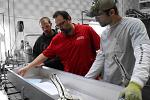- FMA
- The Fabricator
- FABTECH
- Canadian Metalworking
Categories
- Additive Manufacturing
- Aluminum Welding
- Arc Welding
- Assembly and Joining
- Automation and Robotics
- Bending and Forming
- Consumables
- Cutting and Weld Prep
- Electric Vehicles
- En Español
- Finishing
- Hydroforming
- Laser Cutting
- Laser Welding
- Machining
- Manufacturing Software
- Materials Handling
- Metals/Materials
- Oxyfuel Cutting
- Plasma Cutting
- Power Tools
- Punching and Other Holemaking
- Roll Forming
- Safety
- Sawing
- Shearing
- Shop Management
- Testing and Measuring
- Tube and Pipe Fabrication
- Tube and Pipe Production
- Waterjet Cutting
Industry Directory
Webcasts
Podcasts
FAB 40
Advertise
Subscribe
Account Login
Search
Will Olympic uniform outrage be the catalyst for change?
- By Vicki Bell
- July 19, 2012
Most of the feedback to the online report on abcnews.go.com was negative. So was the feedback from “Stamping News Brief” subscribers responding to the last week’s newsletter that featured the ABC report.
After summarizing the report, the newsletter concluded, “The public is up-in-arms about this news, yet it is no different from what’s been happening in manufacturing for years. Walk into any store in the U.S., pick up a product, and check the label. More likely than not, the country of origin will not be the U.S. The same is true for many of the components that go into supposedly U.S.-made products.”
We then asked readers the following questions: Will this latest public outrage about outsourcing be the catalyst for major change in policies that affect U.S. manufacturing? Will consumers boycott Ralph Lauren? Or is this just another “oh, no” moment that will quickly pass as we return to the status quo?
Readers responded.
A reader who works for a Connecticut-based manufacturer of electrical products said, “It won’t even be a blip on the radar to any except those still trying to make a living in manufacturing in this country.”
Jim A. said, “This is a sad example of letting things go too far. We as Americans have a recent history of deciding to allow our industries to be taken from us and dominated by offshore companies in the interest of government-sponsored globalization. We did not consider that the skills we need to maintain are lost when we do so. How are we supposed to keep our edge, when food on the table and a roof over our head (and shop) is the bottom line?
“Keep the market here, utilize a very available workforce through carefully managed craftsman and journeyman training; and work to keep down the costs that make overseas contracts appetizing. Money isn’t everything, but it sure seems like it.
"When was the last time someone said to themselves, ‘Wow, I sure like the way my made-overseas (insert item here) brings me pride in my own abilities to R&D, fabricate, and market it myself?’ C'mon, let’s stop fooling ourselves and take the market back. We can do it, albeit with some sacrifice to short-term wages, but it’s worth it in the long run … but the instant gratification in us all beckons otherwise.”
I would agree that we are a society that runs on instant gratification? What else are we? At least one reader thinks we are apathetic:
“We live in an apathetic country—a money-hungry, selfish country where everyone wants the biggest bang for their buck. So…do you really think anyone’s going to boycott Ralph Lauren? And the only people who will be picketing or speaking out, it won’t affect a thing – it won’t mean a thing – it won’t do anything. Signed, also apathetic in United States”
Well, Apathetic, a tooling engineer in the Northwest U.S. begs to differ. Jim O. wrote, “The tide is beginning to turn on this issue. Daily, more American citizens are realizing that the political, high finance, and major business leaders have sold American manufacturing down the import river.
“The publicity for Ralph Lauren is really bad! This is being splattered across every major news outlet in the U.S. This is more fuel for the Pro-American First fire. This may very well be a catalyst that starts a chain reaction that will burn a very wide path through the apathy of the American people.”
I would like to see U.S. Olympians take medals in London, but I would prefer to see U.S. manufacturing take back jobs from overseas, produce the clothing worn on our Olympians’— and us ordinary citizens’—backs, and perhaps even the medals around the Olympians’ necks. At least we had a hand in the latter. The 2012 Olympic medals were made from nearly nine tons of metal from Rio Tinto's Kennecott Utah Copper mine in Salt Lake City and its Oyu Tolgoi mine in Mongolia.
They were stamped at the Royal Mint in South Wales, which is as it should be.
Follow fabcomlady on Twitter.
Become a fan of The Fabricator® on Facebook.
subscribe now

The Fabricator is North America's leading magazine for the metal forming and fabricating industry. The magazine delivers the news, technical articles, and case histories that enable fabricators to do their jobs more efficiently. The Fabricator has served the industry since 1970.
start your free subscriptionAbout the Author

Vicki Bell
2135 Point Blvd
Elgin, IL 60123
815-227-8209
- Stay connected from anywhere

Easily access valuable industry resources now with full access to the digital edition of The Fabricator.

Easily access valuable industry resources now with full access to the digital edition of The Welder.

Easily access valuable industry resources now with full access to the digital edition of The Tube and Pipe Journal.
- Podcasting
- Podcast:
- The Fabricator Podcast
- Published:
- 04/16/2024
- Running Time:
- 63:29
In this episode of The Fabricator Podcast, Caleb Chamberlain, co-founder and CEO of OSH Cut, discusses his company’s...
- Industry Events
16th Annual Safety Conference
- April 30 - May 1, 2024
- Elgin,
Pipe and Tube Conference
- May 21 - 22, 2024
- Omaha, NE
World-Class Roll Forming Workshop
- June 5 - 6, 2024
- Louisville, KY
Advanced Laser Application Workshop
- June 25 - 27, 2024
- Novi, MI































